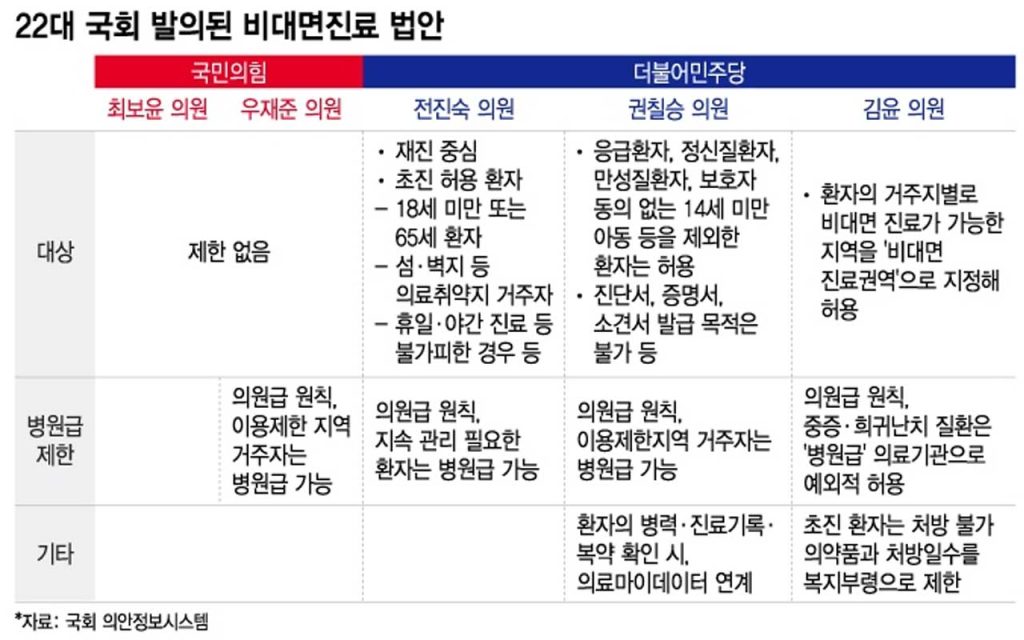South Korea’s telemedicine industry is facing growing uncertainty as five different bills on digital healthcare regulation move through the 22nd National Assembly. Lawmakers are divided over how broadly telemedicine should be allowed and what restrictions should apply, creating a climate of confusion for startups and patients alike. The stakes are high: decisions taken now will shape Korea’s healthcare access and its digital health innovation trajectory for years to come.
Korea’s Telemedicine Debate on National Assembly: Conflicting Bills and Policy Divide
According to industry officials on September 21, five separate bills regulating South Korea’s telemedicine have been proposed so far.
Sponsors include Cho Bo-yoon and Woo Jae-jun of the People Power Party, Jeon Jin-sook, Kwon Chil-seung, and Kim Yoon of the Democratic Party, with Kim Sun-min of the Progressive Innovation Party preparing another draft.
These lawmakers have reportedly proposed different bills with starkly different approaches:
- Regional restriction: Limiting services to providers within the patient’s medical area (Kim Yoon).
- Prescription controls: Mandatory blocking of prohibited medications (Kim Sun-min).
- Follow-up only: Restricting telemedicine to adult patients returning for care (Jeon Jin-sook).
- Broad scope with physician veto: Allowing more use cases but granting doctors the right to refuse telemedicine (Kwon Chil-seung).
- Full authorization: Permitting both initial and follow-up consultations without distinction (Cho Bo-yoon and Woo Jae-jun).
This fragmented policy landscape has left startups facing a murky regulatory horizon, with some fearing that overly restrictive frameworks could negate the progress made in recent years.

Industry Pushback: “Safety and Effectiveness Already Proven”
The telemedicine sector argues that five years of pilot programs have already demonstrated safety and effectiveness. Data from the Korea Startup Forum shows that 4.92 million citizens used telemedicine during the pilot phase, with over 40% from medically underserved groups. Importantly, 99% of cases occurred at clinics and involved minor or chronic conditions, not high-risk procedures.
The industry also highlights existing safeguards against inappropriate prescriptions. Platforms like Doctor Now and My Doctor operate OCR-based monitoring systems to detect prohibited medications.
Between January 2023 and May 2025, only 303 alerts were issued, largely due to physician error and corrected immediately.
Stakeholder Concerns Over Restrictive Proposals
An official from the Telemedicine Industry Council criticized the current debate:
“The newly proposed bills reflect different regulatory stances, but no detailed discussion has taken place. Some drafts exclude both pilot project outcomes and patient-centered perspectives, instead reflecting only the interests of professional associations.”
Another representative warned that excessive restrictions could undermine progress:
“Restrictions centered only on follow-up visits would effectively make telemedicine unworkable. The government must present a reasonable compromise that delivers both public benefit and industrial innovation.”
Korea’s Telemedicine Debate: Why It Matters for the Startup Ecosystem
These national assembly debates on Korea’s telemedicine carry existential outcome for Korea’s digital health startups. After all, the pilot programs have demonstrated not only patient demand but also a pathway for startups to scale services targeting underserved populations.
And so, global investors tracking Asia-Pacific healthcare innovation will be watching closely: Korea has the opportunity to position itself as a digital health hub, but inconsistent policy risks slowing momentum.
Moreover, telemedicine is also a test case for Korea’s broader startup policy environment. Just as fintech regulation shaped Korea’s financial innovation ecosystem, digital healthcare policy will determine whether startups can move beyond pilots and secure sustainable business models.
Therefore, clear regulation is vital for founders, investors, and policymakers so they can unlock both market growth and cross-border scalability.
A Call for Policy Clarity
At the end of the day, South Korea’s telemedicine debate highlights a deeper question: how can regulators balance patient safety, equitable healthcare access, and startup-driven innovation?
With pilot projects showing strong uptake and effective safeguards, the government now faces pressure to move beyond experimentation and deliver a stable framework.
The decisions made in the coming months will not only affect millions of patients but also define Korea’s credibility as a forward-looking digital health ecosystem. For global stakeholders evaluating Korea as a gateway to Asia’s healthcare market, the path lawmakers choose will signal whether Korea is ready to lead—or risk falling behind in the global telehealth race.
– Stay Ahead in Korea’s Startup Scene –
Get real-time insights, funding updates, and policy shifts shaping Korea’s innovation ecosystem.
➡️ Follow KoreaTechDesk on LinkedIn, X (Twitter), Threads, Bluesky, Telegram, Facebook, and WhatsApp Channel.






